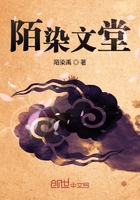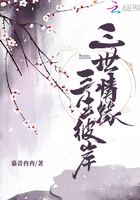Next to his house, though parted from it by another long garden with a yew arbour at the end, is the pretty dwelling of the shoemaker, a pale, sickly-looking, black-haired man, the very model of sober industry. There he sits in his little shop from early morning till late at night. An earthquake would hardly stir him: the illumination did not. He stuck immovably to his last, from the first lighting up, through the long blaze and the slow decay, till his large solitary candle was the only light in the place. One cannot conceive anything more perfect than the contempt which the man of transparencies and the man of shoes must have felt for each other on that evening. There was at least as much vanity in the sturdy industry as in the strenuous idleness, for our shoemaker is a man of substance; he employs three journeymen, two lame, and one a dwarf, so that his shop looks like an hospital; he has purchased the lease of his commodious dwelling, some even say that he has bought it out and out; and he has only one pretty daughter, a light, delicate, fair-haired girl of fourteen, the champion, protectress, and playfellow of every brat under three years old, whom she jumps, dances, dandles, and feeds all day long. A very attractive person is that child-loving girl. I have never seen any one in her station who possessed so thoroughly that undefinable charm, the lady-look.
See her on a Sunday in her simplicity and her white frock, and she might pass for an earl's daughter. She likes flowers too, and has a profusion of white stocks under her window, as pure and delicate as herself.
The first house on the opposite side of the way is the blacksmith's; a gloomy dwelling, where the sun never seems to shine; dark and smoky within and without, like a forge. The blacksmith is a high officer in our little state, nothing less than a constable; but, alas! alas! when tumults arise, and the constable is called for, he will commonly be found in the thickest of the fray. Lucky would it be for his wife and her eight children if there were no public-house in the land: an inveterate inclination to enter those bewitching doors is Mr. Constable's only fault.
Next to this official dwelling is a spruce brick tenement, red, high, and narrow, boasting, one above another, three sash-windows, the only sash-windows in the village, with a clematis on one side and a rose on the other, tall and narrow like itself. That slender mansion has a fine, genteel look. The little parlour seems made for Hogarth's old maid and her stunted footboy; for tea and card parties,--it would just hold one table; for the rustle of faded silks, and the splendour of old china; for the delight of four by honours, and a little snug, quiet scandal between the deals; for affected gentility and real starvation. This should have been its destiny; but fate has been unpropitious: it belongs to a plump, merry, bustling dame, with four fat, rosy, noisy children, the very essence of vulgarity and plenty.
Then comes the village shop, like other village shops, multifarious as a bazaar; a repository for bread, shoes, tea, cheese, tape, ribands, and bacon; for everything, in short, except the one particular thing which you happen to want at the moment, and will be sure not to find. The people are civil and thriving, and frugal withal; they have let the upper part of their house to two young women (one of them is a pretty blue-eyed girl) who teach little children their A B C, and make caps and gowns for their mammas,--parcel schoolmistress, parcel mantua-maker. I believe they find adorning the body a more profitable vocation than adorning the mind.
Divided from the shop by a narrow yard, and opposite the shoemaker's, is a habitation of whose inmates I shall say nothing.
A cottage--no--a miniature house, with many additions, little odds and ends of places, pantries, and what not; all angles, and of a charming in-and-outness; a little bricked court before one half, and a little flower-yard before the other; the walls, old and weather-stained, covered with hollyhocks, roses, honeysuckles, and a great apricot-tree; the casements full of geraniums (ah! there is our superb white cat peeping out from among them); the closets (our landlord has the assurance to call them rooms) full of contrivances and corner-cupboards; and the little garden behind full of common flowers, tulips, pinks, larkspurs, peonies, stocks, and carnations, with an arbour of privet, not unlike a sentry-box, where one lives in a delicious green light, and looks out on the gayest of all gay flower-beds. That house was built on purpose to show in what an exceeding small compass comfort may be packed. Well, I will loiter there no longer.
The next tenement is a place of importance, the Rose Inn: a white-washed building, retired from the road behind its fine swinging sign, with a little bow-window room coming out on one side, and forming, with our stable on the other, a sort of open square, which is the constant resort of carts, waggons, and return chaises.
There are two carts there now, and mine host is serving them with beer in his eternal red waistcoat. He is a thriving man and a portly, as his waistcoat attests, which has been twice let out within this twelvemonth. Our landlord has a stirring wife, a hopeful son, and a daughter, the belle of the village; not so pretty as the fair nymph of the shoe-shop, and far less elegant, but ten times as fine; all curl-papers in the morning, like a porcupine, all curls in the afternoon, like a poodle, with more flounces than curl-papers, and more lovers than curls. Miss Phoebe is fitter for town than country; and to do her justice, she has a consciousness of that fitness, and turns her steps townward as often as she can. She is gone to B---- to-day with her last and principal lover, a recruiting sergeant--a man as tall as Sergeant Kite, and as impudent. Some day or other he will carry off Miss Phoebe.












